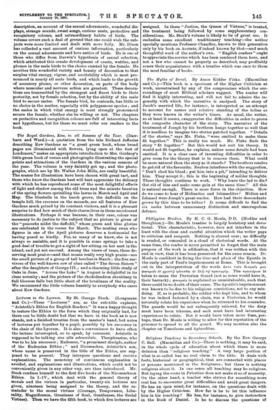The Myths of Israel. By Amos Bidder Fiske. (Macmillan and
Co.)—This book is a specimen of the Higher Criticism at work, unrestrained by any of the compromises which the sur- roundings of most Biblical scholars suggest. The reader will find it highly interesting, and will not fail to admire the in- genuity with which the narrative is analysed. The story of Jacob's married life, for instance, is interpreted as an attempt to account for names and relative standing of the tribes as they were known in the writer's times. As usual, the writer, so at least it seems, exaggerates the difficulties in order to prove the composite character of the story. The narrative of the treatment of Joseph by his brethren hangs together so well that it is needless to imagine two stories patched together. "Details of the stories," says Mr. Fiske, "were omitted to make them fit together." This is really too much. Mr. Fiske finds the story "fit together." But this would not suit his theory. It would not fit together, he explains, unless some details had been omitted. It is a clear case of inventing difficulties in order to give room for the theory that is to remove them. What could be more natural than the story as it stands ? The brothers resolve to get rid of the favourite. Reuben interferes with the suggestion, "Don't shed his blood ; put him into a pit," intending to deliver him. They accept it ; this is the beginning of milder thoughts. These thoughts continue to work. "Why leave the lad to die ? Get rid of him and make some gain at the same time." All this is natural enough. There is more force in the objection. How do we come to hear of Midianites and Ishmaelites ? Midian and Ishmael were Joseph's great-uncles. How had their descendants grown by this time to be tribes ? It seems difficult to find the via media between unnecessary distinction and unscrupulous defence.


















































 Previous page
Previous page